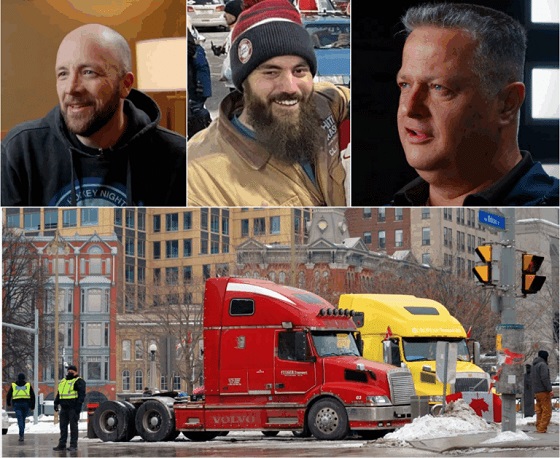ESG
Can’t afford Rent? Groceries for your kids? Trudeau says suck it up and pay the tax!

Watch Canada’s Prime Minister tell an anti-poverty group, your ability to buy “groceries for my kids” is less important than sacrificing to pay his carbon tax.
In case you still thought there might be even the tiniest chance Justin Trudeau might come around.. well this settles it. He is as they say, ‘beyond the pale’.
Sure we’ve pieced this together over the last number of years, but it’s still SHOCKING to see him say it directly, proclaim it proudly. This week Trudeau received applause from an audience of the intellectually suffering at something called the “Global Citizen Now” panel discussion on the sidelines of the G20 Leaders’ Summit in Rio.
Much appreciation for the first short video below to Opposition Leader Pierre Poilievre who shared his ferocious reaction to Trudeau’s anti-human comments, challenging the current PM to call an immediate election.
Or course there will be no quick election call. To Justin, it’s more important to cling to the undercarriage of a taxpayer funded jet so he can fly the globe stunning audiences unfortunately already stunned by their utter terror of losing the planet.
In their horror at their inability to turn the switch off and let us all freeze/starve to death this winter, they applaud lovingly for their intellectual leader/sock model as he describes how hard it is to convince angry, hungry people they really need to suck it up.
If only he read a history book.. any history book.. apologies, any book at all. Truly even spending some time with the literary version of an Al Gore video rant would at lest keep JT occupied so he couldn’t speak for a few moments. I’m pretty sure every time he opens his mouth, the temperature in Canada rises as millions of frustrated hotheads (hello there) explode, spewing steam high up into the upper atmosphere where water particles do much more damage to our planet than the final exhaling of a non grocery-eating-planet-loving-Canadian.
Watch Pierre Poilievre’s video and assuage the ensuing headache by mapping out your route to a polling booth. If this doesn’t sell a couple of those ‘Axe the Tax’ shirts for the Poilievre team, well.. enjoy your stroll to the foodbank.
Here’s a link to his entire discussion. If you have a strong stomach and 20 minutes of your life to donate to a higher cause… No silly, not the intended cause of the anti-poverty group… But to the intellectual cause of understanding just how twisted the logic has become for those who fly around the world to wine and dine, only to break long enough to tell us they think it’s perfectly fine if we can’t buy groceries for our kids.
By the way, please save a bit of your shock and disappointment for the hapless host of the ‘anti-poverty’ Global Citizen. This was apparently on the sidelines of a G20 Summit. I would expect this drivel to be called out at a respectable middle school debate. Apparently the ‘anti-poverty’ Global Citizen people aren’t overly concerned with poverty. Do we need to say that not being able to afford groceries is in fact THE definition of poverty? Or course not. It would be much easier for them to change their name to Former Global Citizens.
You were warned.
Business
BlackRock CEO Larry Fink is new co-chair of WEF, finds no misconduct in Klaus Schwab

From LifeSiteNews
In what appears to be the most obvious conflict of interest in history, the World Economic Forum which was formed to infiltrate governments and influence government decisions has elected two of the world’s largest hedge fund managers as co-chairs.
The World Economic Forum (WEF) has elected BlackRock CEO Larry Fink and Roche Holding vice-chair Andre Hoffmann to serve as interim co-chairs of its board.
Last Friday, the WEF announced that the investigation into Klaus Schwab had found no misconduct by its former chairman and founder. In the same press release, the globalist organization also announced Fink and Hoffmann as new interim leaders.
Schwab was under investigation in April this year after a whistleblower alleged financial impropriety and behavioral issues. The 87-year-old Schwab had already resigned from his position as chairman of the board shortly before the investigation was launched.
“Minor irregularities, stemming from blurred lines between personal contributions and Forum operations, reflect deep commitment rather than intent of misconduct,” the WEF stated in regard to the allegations made against Klaus Schwab and his wife Hilde.
WATCH: Dark origin and agenda of Klaus Schwab’s World Economic Forum
“Following a thorough review of all facts, the Board has concluded that, while the organization must evolve toward a more institutional model, there is no evidence of material wrongdoing by Klaus Schwab,” the organization concluded.
Larry Fink is no stranger to the critics of the globalist “Great Reset” agenda spearheaded by Schwab. He founded BlackRock, the largest asset manager in the world, presiding over $10 trillion in assets, more than any country except the U.S. and China.
He announced in 2017 that he intends to use the enormous power he wields to engage in “forcing behaviors” in support of diversity and inclusion – and to promote the ESG agenda endorsed by the World Economic Forum. Fink, at the time, even threatened any companies who refuse to submit to his vision with punitive economic measures.
“You have to force behaviors. If you don’t force behaviors, whether it’s gender or race or just any way you want to say the composition of your team, you’re going to be impacted. That not just recruiting, it’s development,” Fink said. “We’re gonna have to force change.”
READ: BlackRock CEO Larry Fink: Understanding the man who invented woke capitalism
Over the last several years, the WEF’s annual meeting of political and business elites in the Swiss mountain town of Davos has become synonymous with globalism. Even the mainstream news outlet Reuters wrote that the gathering “has in recent years drawn criticism from opponents on both left and right as an elitist talking shop detached from lives of ordinary people.”
Business
ESG: The Use of Non-Financial Metrics by the Investment Industry is a Lawsuit Waiting to Happen

-

 Frontier Centre for Public Policy1 day ago
Frontier Centre for Public Policy1 day agoBloodvein Blockade Puts Public Land Rights At Risk
-

 Business2 days ago
Business2 days agoDeportations causing delays in US construction industry
-

 Alberta2 days ago
Alberta2 days agoParents group blasts Alberta government for weakening sexually explicit school book ban
-

 Automotive2 days ago
Automotive2 days agoMichigan could be a winner as companies pull back from EVs
-

 International1 day ago
International1 day agoFrance records more deaths than births for the first time in 80 years
-

 National1 day ago
National1 day agoChrystia Freeland resigns from Mark Carney’s cabinet, asked to become Ukraine envoy
-

 Business1 day ago
Business1 day agoThe Truth Is Buried Under Sechelt’s Unproven Graves
-

 Energy1 day ago
Energy1 day agoA Breathtaking About-Face From The IEA On Oil Investments







